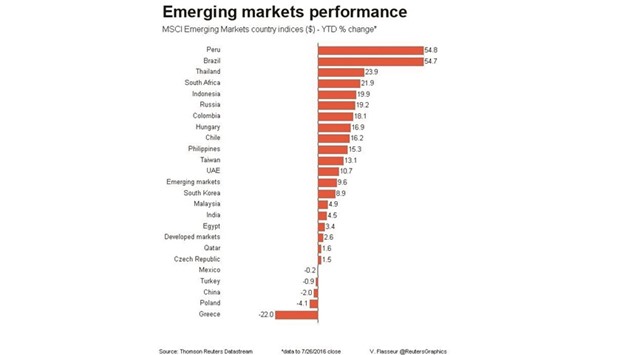Emerging stocks touched 11-month highs yesterday, boosted by news of additional Japanese stimulus and shrugging off a sharp drop in mainland shares in China, where fears of a fresh regulatory crackdown are weighing.
Markets are waiting for the outcome of a US Federal Reserve meeting that may signal if the bank expects to raise interest rates this year, while Japan announced an extra dose of economic stimulus ahead of meeting on Friday at which the central bank could ease policy even further.
Emerging stocks tracked their developed market peers higher, with the MSCI’s main equity benchmark up 0.3%, while most emerging currencies firmed slightly against the dollar.
Some nerves were jangled by a 2% fall in Shanghai-listed shares, which posted their worst day in six weeks while the Shenzhen index lost 1.6% and small caps fell almost 6%.
Analysts cited a meeting in Beijing on Tuesday in which officials warned of asset bubbles.
The slide also revived memories of last summer’s rout that saw Shenzhen stocks slump 45% in three months.
The sell-off did not spread to Hong Kong-listed Chinese shares, which rose 0.2% to trade just off seven-month highs, while other Asian markets also firmed, focusing on the Japanese stimulus.
William Jackson at Capital Economics said emerging markets were benefiting from “the prospect of continued loose policy by major central banks and also some of the fears that had clouded the market, such as the Brexit vote having a spillover, have eased”.
In emerging Europe, Turkish stocks rose half a per cent, with tourism-linked companies including Turkish Airlines up more on hopes that a rapprochement with Russia could drive some recovery in slumping tourism numbers.
There are also hopes that Moscow will lift its Turkish food import embargo, developments that could partly offset damage caused by this month’s failed coup and subsequent crackdown.
Turkey’s lira rose 0.2% against the dollar to around 3.03 per dollar.
Commerzbank analysts forecast more lira weakening, predicting core inflation to stay around 8% even though central bank governor Murat Cetinkaya said on Tuesday that core inflation would continue to moderate.
“(This) means that room for monetary easing is limited.
Nevertheless,(the central bank) will continue to ease policy — the governor made this clear yesterday.
We see dollar/lira at 3.25 by year-end,” Commerzbank added.
Investors were also keeping an eye on two African markets, Nigeria and Egypt, where financial and currency reforms are under way.
Nigeria’s naira is at record lows after being effectively floated in the past week, but could get some support from Tuesday’s 200-basis-point rate rise.
Some also expect a devaluation in Egypt today when the central bank meets, and news that Cairo is about to agree a loan deal with the International Monetary Fund (IMF) boosted local stocks 3.3%.
In eastern Europe, Warsaw stocks fell almost 1%, led by Bank Pekao which tumbled almost 5% on news Unicredit was mulling selling its entire stake in Poland’s No 2 lender.

EME
